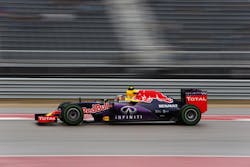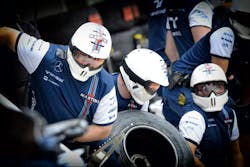Big data extracted from vehicles are allowing the creation of more finely-tuned fleet “ecosystems” in the view of David Cozzens, CEO of Telogis, who argued at his company’s yearly user group meeting that digitally tying people and the work they perform more tightly to their vehicles is the next big leap being taken by telematics systems today.
“’Connected intelligence’ is about connecting vehicles, it’s about connecting assets and it’s about connecting people and the work that’s happening in the field to continually optimize and even transform how the work might be done,” Cozzens explained during the keynote speech at the annual Telogis Latitude 2015 conference being held outside Los Angeles, CA, this week.
He said Telogis calls this strategy “Vehicle as a Hub,” which essentially turns a vehicle into a WiFi “hotspot” to connect workers in the field with those vehicles and their home offices via mobile devices.
“With this connectivity in the vehicle, we’re able to get rich diagnostic data like seat belt utilization, tire pressure monitoring, oil life status as well as diagnostic trouble codes – all in real time,” he said.
Yet it’s not just about knowing where trucks are anymore or pulling vehicle diagnostic data for analysis, Cozzens stressed.
“We’re also able to pull data from other sensors that give you a broader understanding of what’s happening in your business, and allow you to manage everything in your ecosystem – not just the vehicle itself,” he emphasized. “We’ve worked with construction companies to pull [the] amount of asphalt laid in the last hour or the amount of cement poured yesterday, or even the amount of water delivered to a construction site.”
But what’s “really exciting,” Cozzens said, is getting such sensor data off tens, hundreds, thousands, or even tens of thousands of vehicles and assets, then taking that data and building from it “true connected intelligence.”
And to get there means processing a lot of data – in fact, processing more than one billion data points every day, which is what Cozzens said Telogis is now doing.
He pointed to modern-day Formula One race teams as an example of how such “connected intelligence” is being deployed within vehicle “ecosystems” to enhance overall performance.“Every Formula One race car has more than 100 sensors collecting real-time data to ensure success on race day, as well as data that’s analyzed after a race to give a competitive edge,” Cozzens explained. “This information is used to continuously optimize the vehicle.”
Whether it’s analyzing aerodynamics, engine performance or providing information about track conditions, tires and even information on competitors, everything is data-driven, he noted.
“Instead of one guy being responsible for all of this data, this information is not only shared with the driver but with the more than 60 engineers and support staff connected onsite at the track as well as 100 remote engineers in the U.K. and France – all analyzing this data and running simulations in real time on all the possible outcomes of the race,” he pointed out.
In fact, the Formula One business is so “optimized” that Cozzens said winning and losing is now a matter of milliseconds.
“They have gotten it so precise that the world record for a Formula One pit stop is now down to one-point-nine seconds to change tires, refuel and get back on the track,” he emphasized. “That is the definition of powerful connected intelligence.”
Yet Cozzens stressed that businesses don’t have to be a Formula One race team to benefit from this kind of connected intelligence.
“What we’re talking about here is empowering the mobile workforce and what this leads to is agility – allowing companies to make better faster smarter decisions to be even more competitive,” he said.
“All of this information that’s being pulled becomes big data, and you need to be able to make sense of it, analyze it and use it to make your organization better,” Cozzens pointed out. “It gets fed back into the Telogis platform and allows it to get smarter, generating continuous optimization and thus a better plan for tomorrow.”
About the Author
Wendy Leavitt
Wendy Leavitt is a former FleetOwner editor who wrote for the publication from 1998 to 2021.

